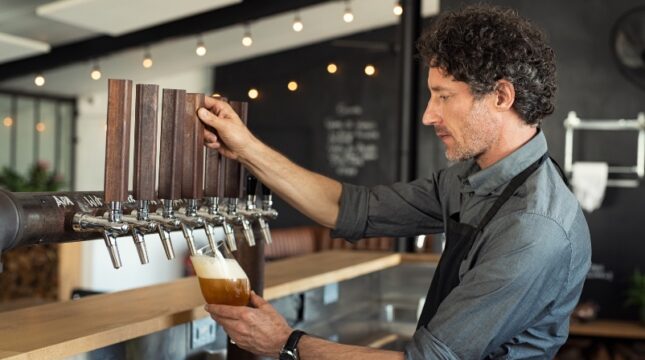Who needs a Washington State food handlers card?
Any employee who handles unpackaged food, food equipment, utensils or surfaces where people put unwrapped food must get a food handlers card. Washington requires that employers provide food safety training to employees who don’t have a food handler card before starting work. In addition, employees must complete a course and pass an exam to get an official Food Worker Card within 14 days of employment.
The Washington State Department of Health food handlers card certification requirements apply to kitchen staff, servers, bussers, hosts, bartenders and other employees in a food service business.
Exemptions from this mandate include:
- Employees at places serving only pre-packaged foods.
- Staff at establishments offering foods that don’t require time or temperature control.
- Adult caregivers trained in safe food handling as part of their caregiver training.
Additionally, food service workers with disabilities whose work consists of low public health risk activities such as bussing or dishwashing can earn a limited duty card instead.
Besides ensuring compliance with Washington state law, employing certified food handlers can help protect your business. The certification process teaches employees about safe food handling techniques and proper food preparation to reduce the risk of foodborne illness.
How to get a food handlers card in Washington State
To get a food handler permit, Washington food service workers must complete a training program. All local health departments offer training, exams, and cards. Keep in mind that the only authorized online training program is the Washington State Food Worker Course developed by the Tacoma-Pierce County Health Department.
The program covers various topics in the Washington State Food Worker Manual related to safe food handling, including:
- Foodborne illness and prevention.
- Temperature control.
- Handwashing.
- Cross-contamination.
- Food allergies.
- Cleaning, sanitation and dishwashing.
After completing the course, participants must pass an exam to receive their official Food Worker Card.
Once an employee has successfully completed a course online or in-person with the local health department, workers will receive a physical food handler card. Washington state requires that employers keep a copy of their employees’ food handler cards on file for health inspections.
All food handler cards in Washington are issued and signed by a local health officer and include the name and signature of the food service worker, the card’s expiration date and the name of the health department issuing the card.
Food handlers cards issued through the state online training program or a county health department are accepted statewide. Washington does not recognize any out-of-state food handler cards.
Insurance for Washington restaurants, caterers, cafes and food service businesses
Restaurant owners can help protect their businesses from everyday risks with Washington State business insurance. Consider these insurance options:
General liability insurance
General liability insurance can help protect your business from financial fallout if you’re found liable for property damage or injury to a third party.
Food service general liability insurance can also include restaurant-specific coverage for risks such as foodborne illness. If customers get sick from food prepared incorrectly or contaminated, this coverage may help cover related fees.
Workers’ compensation insurance
Washginton state requires almost all businesses to have workers’ compensation insurance. It can help cover costs such as lost wages or medical expenses if an employee is injured on the job.
Commercial property insurance
Commercial property insurance can protect your physical assets (inventory, equipment, furniture, buildings) in case of covered events like fire or burst pipes. It can help pay for repairs or replacements.
Commercial auto insurance
If you or your employees drive for work, commercial auto insurance can help provide necessary coverage for medical expenses, property damage and other financial losses that result from an accident.
Washington mandates minimum bodily injury liability coverage of $25,000 per person and $50,000 per accident, plus $10,000 for property damage.
How much is a Washington State food handlers card?
In Washington, workers can get their food handler card online via the government-authorized training program or in person at their local health department. The cost for this card is $10, whether you complete the course online or in person.
Some employers might pay for this certification, but it’s not a state requirement. This card belongs to the employee and is valid across Washington.
How long does it take to get a Washington State food handlers permit?
Employees can work up to 14 days before getting their card if the employer provides food safety training. The food handler certification course and exam usually take 1 to 3 hours, including at least 30 minutes of instruction.
After completing the course, passing the exam, and paying the certification fee, participants receive their food handler certification. Washington state issues physical cards to all certified food handlers.
Initial Washington food handler cards are valid for two years from the date they are issued. Food service workers can apply for a new food worker handler certification up to 60 days before their current card expires.
If you renew your card before it expires, food service workers can get a three-year card. Otherwise, the health department will issue a two-year card if yours is already expired.
A five-year card is an option if you have a current certification card and go through advanced training, like the ServeSafe Food Managers Course.
Food handlers vs. Certified food protection managers
Unless the Certified Food Protection Managers (CFPM) acts as a food worker, they don’t have to fulfill the food handler card requirements. The CFPM undergoes a separate certification process and ensures that all managers and employees are trained in food safety and comply with best practices.
While every acting manager at a food service business must have Active Managerial Control (AMC) with policies and procedures to control foodborne illness risk factors, the Washington State Retail Food Code requires most food establishments also to have at least one employee with a CFPM certificate. You will likely need to get this certification yourself if you do not have any employees.
How NEXT helps support Washington State restaurants, cafes, caterers and food service
NEXT has hassle-free, tailored Washington restaurant and food business insurance policies for small businesses and self-employed business owners.
It’s fast and simple. In about 10 minutes, you can get a quote, review your coverage options, choose your policies, and download a certificate of insurance.
Questions? Our team of licensed insurance advisors is ready to help.
Start a free quote with NEXT.





